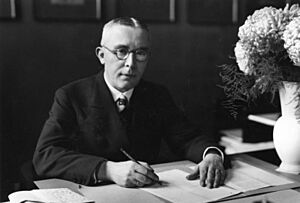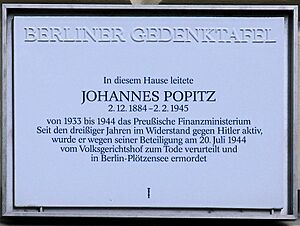Johannes Popitz facts for kids
Quick facts for kids
Johannes Popitz
|
|
|---|---|
 |
|
| Prussian Minister of Finance and Minister of State |
|
| In office 21 April 1933 – 21 July 1944 |
|
| Prime Minister | Hermann Göring |
| Preceded by | Himself (as Reichskommissar) |
| Succeeded by | None |
| Reichskommissar Prussian Ministry of Finance |
|
| In office 29 October 1932 – 21 April 1933 |
|
| Chancellor | Kurt von Schleicher Franz von Papen Adolf Hitler |
| Preceded by | Franz Schleusener |
| Succeeded by | Himself (as Minister of Finance) |
| Reichsminister without Portfolio | |
| In office 29 October 1932 – 30 January 1933 |
|
| Chancellor | Kurt von Schleicher Franz von Papen |
| State Secretary Prussian Ministry of Finance |
|
| In office 1925 – 21 December 1929 |
|
| Prime Minister | Otto Braun |
| Personal details | |
| Born | 2 December 1884 Leipzig, Kingdom of Saxony, German Empire |
| Died | 2 February 1945 (aged 60) Plötzensee Prison, Berlin, Nazi Germany |
| Cause of death | Execution by hanging |
| Political party | Nazi Party (from January 1937) |
| Profession | Lawyer |
Johannes Popitz (born December 2, 1884 – died February 2, 1945) was a German lawyer and a government official in Prussia. He later became part of the German Resistance movement, which worked against the Nazi government. He was also the father of Heinrich Popitz, who became a well-known German sociologist.
Contents
Early Life and Education
Johannes Popitz was born in Leipzig, Germany. His father was a pharmacist. Popitz studied political science and law at several universities, including Lausanne, Leipzig, Berlin, and Halle.
From 1907 to 1918, he worked as a junior government lawyer. In 1918, he married Cornalia Slot, and they had three children together.
Career in Government
After 1919, Popitz became an important advisor in the finance ministry of the Weimar Republic, which was Germany's government at the time. From 1922, he also taught about tax law and financial topics at the University of Berlin.
Between 1925 and 1929, Popitz served as a State Secretary in the German Ministry of Finance. He worked under Finance Minister Rudolf Hilferding. In December 1929, he left his job due to disagreements with the government.
Working for Prussia
In 1932, the German government took control of the state of Prussia. On October 29, 1932, Popitz was made the head of the Prussian Finance Ministry. He was given the special title of Reichskommissar. He also became a minister without a specific department in the national government, working as an independent politician.
He kept these roles when Kurt von Schleicher became Chancellor in December 1932. When the Nazis took power on January 30, 1933, Popitz remained in charge of the Prussian Finance Ministry. However, he was not made a member of Adolf Hitler's new national government.
Under Nazi Rule
On April 21, 1933, the Prussian government was reformed under Hermann Göring. Popitz was officially named a Minister of State and Finance Minister in this new Prussian cabinet. At this time, he was not yet a member of the Nazi Party.
As a member of the Prussian cabinet, Popitz also joined the new Prussian State Council in July 1933. He also became a member of the Academy for German Law in October 1933, where he helped lead a committee on economic and scientific law. He held these positions until July 1944.
On January 30, 1937, Hitler gave a special award called the Golden Party Badge to several non-Nazi government members. By accepting this award, Popitz officially joined the Nazi Party.
Resistance Against the Nazis
After Kristallnacht (a violent attack on Jewish people and their businesses in November 1938), Popitz showed his disapproval by offering to resign. His resignation was not accepted.
Popitz was a conservative and a monarchist, meaning he preferred a king or queen to rule. He hoped that Crown Prince Wilhelm, the son of the former Kaiser, would take over after Hitler. Because of these beliefs, Popitz became involved in groups that resisted Hitler starting in 1938. He worked with groups like the one led by Carl Friedrich Goerdeler.
He was also part of a group called the Mittwochsgesellschaft ("Wednesday Society"). This group of officials and business leaders started as a debating club but became a center for opposing the Nazi government. Popitz became more involved in planning to overthrow Hitler. He even wrote a temporary plan for a new government after Hitler was gone.
Secret Talks and Arrest
In the summer of 1943, Popitz held secret meetings with Heinrich Himmler, a powerful Nazi leader. Popitz tried to convince Himmler to support a coup d'état (a sudden takeover of the government). He also tried to get Himmler to help negotiate a peace deal with the Western Allies.

However, by the autumn of 1943, the Gestapo (the Nazi secret police) began watching Popitz. He was arrested in Berlin on July 21, 1944. This was the day after Claus von Stauffenberg's unsuccessful attempt to assassinate Hitler at the Wolfsschanze.
Trial and Death
On October 3, 1944, Popitz was sentenced to death by the Volksgerichtshof, a special court, with Roland Freisler as the judge. At first, Himmler delayed Popitz's execution, hoping that the talks with the Allies might still happen.
However, when it became clear that no such talks would occur, Popitz's fate was sealed. He was hanged on February 2, 1945, at Plötzensee Prison in Berlin.

